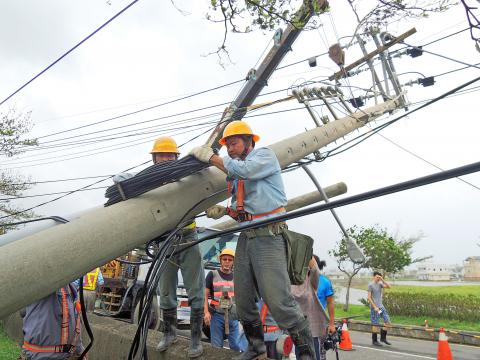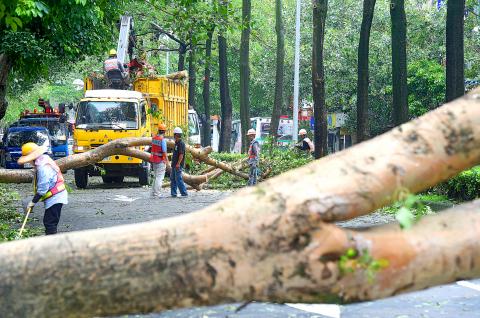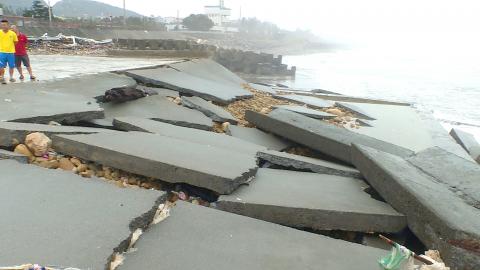Three people died and 376 were injured as Typhoon Dujuan pummeled the nation with torrential rainfall and strong winds, the Central Emergency Operation Center said yesterday.
Among the three people killed was a 70-year-old man in New Taipei City’s Tucheng District (土城), who fell to the ground and died after being blown over by a gust of wind.
A 54-year-old worker in Taichung was flung into the air by strong winds as he stood on a corrugated steel sheet on a fence near a construction site.

Photo: Chiang Chih-hsiung, Taipei Times
He died after falling from a height of about 3m.
The third person killed was a 41-year-old woman surnamed Yu (余), who died after sustaining serious injuries in a car accident during the storm.
By 8am yesterday, about 12,000 people had been evacuated, the center said.

Photo: Chien Jung-fong, Taipei Times
The typhoon disrupted water and power supplies in northern Taiwan.
Data from Taiwan Power Co (Taipower) showed that electricity was not available for more than 2.27 million households at one point.
Taipower said that by 6:30pm yesterday, 119,048 households had yet to regain power supplies.

Photo: CNA
Taiwan Water Corp suspended the water supply to almost 150,000 households and reduced water pressure to 145,200 households over high river turbidity.
The water company said normal water supply would resume completely by 6am today.
The nation’s main transportation systems had largely resumed normal operations yesterday.
Taiwan High Speed Rail Corp began train operations at 11:30am yesterday from Taipei, Taichung, Tainan and Kaohsiung high-speed rail stations to facilitate the transportation of passengers, many of whom are to return to work today,
The Taiwan Railways Administration (TRA) reported severe damage to the North Link Railway and resumed services nationwide by 6pm yesterday, although trains could only operate on one set of tracks in some sections.
Taiwan Taoyuan International Airport estimated that about 126,000 passengers accessed the airport yesterday as airlines resumed flights, with passengers beginning to line up at check-in counters as early as 4:30am.
Though the Central Weather Bureau had not lifted sea and land alerts by 5:30pm yesterday, the wind and rain brought by Dujuan had largely eased by early yesterday morning.
The Ministry of Transportation and Communications apologized to the public for crowds in railway stations on Monday, which was the last day of the Mid-Autumn Festival holiday.
Deputy Minister Tseng Dar-jen (曾大仁) said the ministry would henceforth activate emergency transport plans as soon as a land alert for a typhoon is announced during a major national holiday.
When the occurrence of a typhoon coincides with any of the nation’s major holidays, alternative transportation methods would be arranged for the high-speed rail system, TRA systems, then buses, in that order, Tseng said.
People would be given maximum flexibility if they ask for a refund or to exchange for train tickets departing on other days given the extenuating circumstances, Tseng added.
The high-speed rail system transported 180,000 passengers between 6am and 3pm on Monday, Tseng said.
In the past, the system could transport up to 240,000 passengers per day.

Tropical Storm Gaemi strengthened into a typhoon at 2pm yesterday, and could make landfall in Yilan County tomorrow, the Central Weather Administration (CWA) said yesterday. The agency was scheduled to issue a sea warning at 11:30pm yesterday, and could issue a land warning later today. Gaemi was moving north-northwest at 4kph, carrying maximum sustained winds near its center of up to 118.8kph and gusts of 154.8kph. The circumference is forecast to reach eastern Taiwan tomorrow morning, with the center making landfall in Yilan County later that night before departing from the north coast, CWA weather forecaster Kuan Shin-ping (官欣平) said yesterday. Uncertainty remains and

SEA WARNING LIKELY: The storm, named Gaemi, could become a moderate typhoon on Wednesday or Thursday, with the Taipei City Government preparing for flooding A tropical depression east of the Philippines developed into a tropical storm named Gaemi at 2pm yesterday, and was moving toward eastern Taiwan, the Central Weather Administration (CWA) said. Gaemi could begin to affect Taiwan proper on Tuesday, lasting until Friday, and could develop into a moderate typhoon on Wednesday or Thursday, it said. A sea warning for Gaemi could be issued as early as Tuesday morning, it added. Gaemi, the third tropical storm in the Pacific Ocean this typhoon season, is projected to begin moving northwest today, and be closest to Taiwan on Wednesday or Thursday, the agency said. Today, there would likely

DISRUPTIONS: The high-speed rail is to operate as normal, while several airlines either canceled flights or announced early departures or late arrivals Schools and offices in 15 cities and counties are to be closed today due to Typhoon Gaemi, local governments announced last night. The 15 are: Taipei, New Taipei City, Taoyuan, Tainan, Keelung, Hsinchu and Kaohsiung, as well as Yilan, Hualien, Hsinchu, Miaoli, Chiayi, Pingtung, Penghu and Lienchiang counties. People should brace for torrential rainfall brought by the storm, with its center forecast to make landfall on the east coast between tonight and tomorrow morning, the Central Weather Administration (CWA) said. The agency issued a sea warning for the typhoon at 11:30pm on Monday, followed by a land warning at 11:30am yesterday. As of

CASUALTY: A 70-year-old woman was killed by a falling tree in Kaohsiung as the premier warned all government agencies to remain on high alert for the next 24 hours Schools and offices nationwide are to be closed for a second day today as Typhoon Gaemi crosses over the nation, bringing torrential rain and whipping winds. Gaemi was forecast to make landfall late last night. From Tuesday night, its outer band brought substantial rainfall and strong winds to the nation. As of 6:15pm last night, the typhoon’s center was 20km southeast of Hualien County, Central Weather Administration (CWA) data showed. It was moving at 19kph and had a radius of 250km. As of 3pm yesterday, one woman had died, while 58 people were injured, the Central Emergency Operation Center said. The 70-year-old